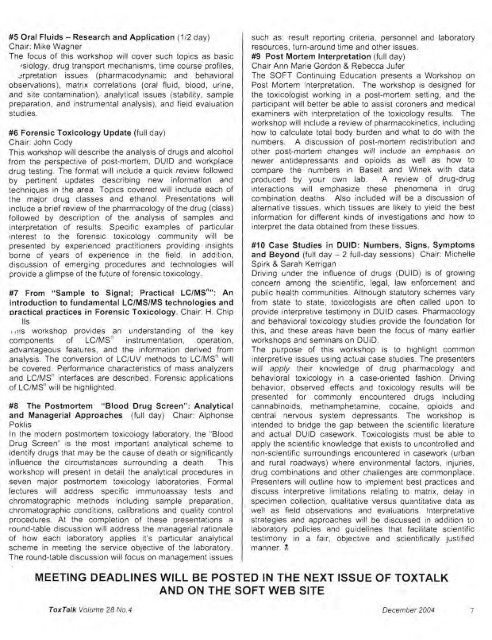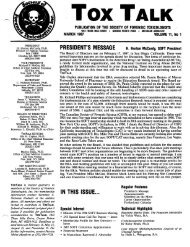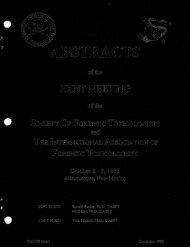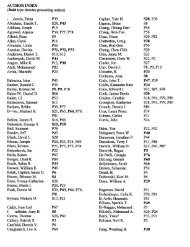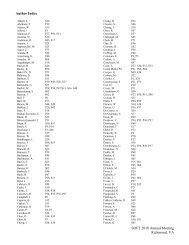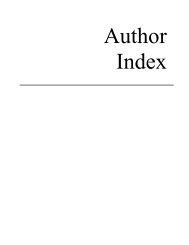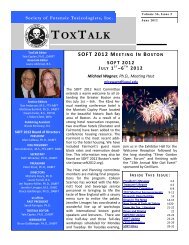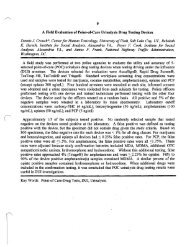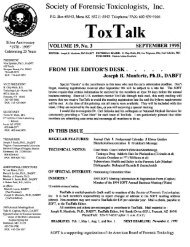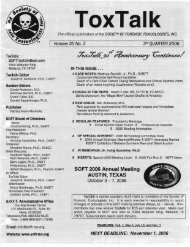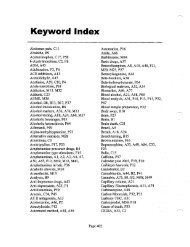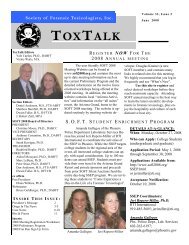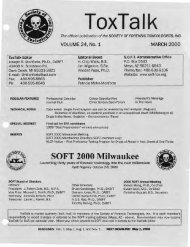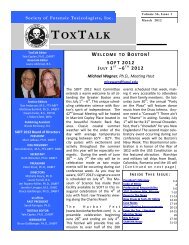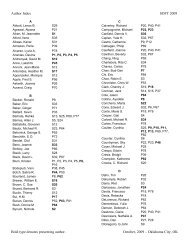ToxTalk Volume 28-4 - Society of Forensic Toxicologists
ToxTalk Volume 28-4 - Society of Forensic Toxicologists
ToxTalk Volume 28-4 - Society of Forensic Toxicologists
You also want an ePaper? Increase the reach of your titles
YUMPU automatically turns print PDFs into web optimized ePapers that Google loves.
#5 Oral Fluids - Research and Application (1/2 day)<br />
Chair: Mike Wagner<br />
The focus <strong>of</strong> this workshop will cover such topics as basic<br />
'siology, drug transport mechanisms, time course pr<strong>of</strong>iles,<br />
.:!rpretation issues (pharmacodynamic and behavioral<br />
observations), matrix correlations (oral fluid, blood, urine,<br />
and site contamination), analytical issues (stability, sample<br />
preparation, and instrumental analysis), and field evaluation<br />
studies.<br />
#6 <strong>Forensic</strong> Toxicology Update (full day)<br />
Chair: John Cody<br />
This workshop will describe the analysis <strong>of</strong> drugs and alcohol<br />
from the perspective <strong>of</strong> post-mortem , DUID and workplace<br />
drug testing. The format will include a quick review followed<br />
by pertinent updates describing new information and<br />
techniques in the area. Topics covered will include each <strong>of</strong><br />
the major drug classes and ethanol. Presentations will<br />
include a brief review <strong>of</strong> the pharmacology <strong>of</strong> the drug (class)<br />
followed by description <strong>of</strong> the analysis <strong>of</strong> samples and<br />
interpretation <strong>of</strong> results. Specific examples <strong>of</strong> particular<br />
interest to the forensic toxicology community will be<br />
presented by experienced practitioners providing insights<br />
borne <strong>of</strong> years <strong>of</strong> experience in the field . In addition,<br />
discussion <strong>of</strong> emerging procedures and technologies will<br />
provide a glimpse <strong>of</strong> the future <strong>of</strong> forensic toxicology.<br />
#7 From "Sample to Signal; Practical LC/MS n ,,: An<br />
introduction to fundamental LC/MS/MS technologies and<br />
p.ractical practices in <strong>Forensic</strong> Toxicology. Chair: H. Chip<br />
lis<br />
I "is workshop provides an understanding <strong>of</strong> the key<br />
components <strong>of</strong> LC/MS n instrumentation, operation,<br />
advantageous features, and the information derived from<br />
analysis. The conversion <strong>of</strong> LC/UV methods to LC/MS n will<br />
be covered. Performance characteristics <strong>of</strong> mass analyzers<br />
and LC/MS n interfaces are described. <strong>Forensic</strong> applications<br />
<strong>of</strong> LC/MS n will be highlighted.<br />
#8 The Postmortem "Blood Drug Screen"; Analytical<br />
and Managerial Approaches (full day) Chair: Alphonse<br />
Poklis<br />
In the modern postmortem toxicology laboratory, the "Blood<br />
Drug Screen" is the most important analytical scheme to<br />
identify drugs that may be the cause <strong>of</strong> death or significantly<br />
influence the circumstances surrounding a death. This<br />
workshop will present in detail the analytical procedures in<br />
seven major postmortem toxicology laboratories. Formal<br />
lectures will address specific immunoassay tests and<br />
chromatographic methods including sample preparation,<br />
chromatographic conditions, calibrations and quality control<br />
procedures. At the completion <strong>of</strong> these presentations a<br />
round-table discussion will address the managerial rationale<br />
<strong>of</strong> how each laboratory applies it's particular analytical<br />
scheme in meeting the service objective <strong>of</strong> the laboratory.<br />
The round-table discussion will focus on management issues<br />
such as: result reporting criteria, personnel and laboratory<br />
resources, turn-around time and other issues.<br />
#9 Post Mortem Interpretation (full day)<br />
Chair Ann Marie Gordon & Rebecca Jufer<br />
The SOFT Continuing Education presents a Workshop on<br />
Post Mortem Interpretation . The workshop is designed for<br />
the toxicologist working in a post-mortem setting, and the<br />
participant will better be able to assist coroners and medical<br />
examiners with interpretation <strong>of</strong> the toxicology results. The<br />
workshop will include a review <strong>of</strong> pharmacokinetics, including<br />
how to calculate total body burden and what to do with the<br />
numbers. A discussion <strong>of</strong> post-mortem redistribution and<br />
other post-mortem changes will include an emphasis on<br />
newer antidepressants and opioids as well as how to<br />
compare the numbers in Baselt and Winek with data<br />
produced by your own lab. A review <strong>of</strong> drug-drug<br />
interactions will emphasize these phenomena in drug<br />
combination deaths. Also included will be a discussion <strong>of</strong><br />
alternative tissues, which tissues are likely to yield the best<br />
information for different kinds <strong>of</strong> investigations and how to<br />
interpret the data obtained from these tissues.<br />
#10 Case Studies in DUID: Numbers, Signs, Symptoms<br />
and Beyond (full day - 2 full-day sessions) Chair: Michelle<br />
Spirk & Sarah Kerrigan<br />
Driving under the influence <strong>of</strong> drugs (DUID) is <strong>of</strong> growing<br />
concern among the scientific, legal, law enforcement and<br />
public health communities. Although statutory schemes vary<br />
from state to state, toxicologists are <strong>of</strong>ten called upon to<br />
provide interpretive testimony in DUID cases. Pharmacology<br />
and behavioral toxicology studies provide the foundation for<br />
this, and these areas have been the focus <strong>of</strong> many earlier<br />
workshops and seminars on DUID.<br />
The purpose <strong>of</strong> this workshop is to highlight common<br />
interpretive issues using actual case stUdies. The presenters<br />
will apply their knowledge <strong>of</strong> drug pharmacology and<br />
behavioral toxicology in a case-oriented fashion. Driving<br />
behavior, observed effects and toxicology results will be<br />
presented for commonly encountered drugs including<br />
cannabinoids, methamphetamine, cocaine, opioids and<br />
central nervous system depressants. The workshop is<br />
intended to bridge the gap between the scientific literature<br />
and actual DUID casework. <strong>Toxicologists</strong> must be able to<br />
apply the scientific knowledge that exists to uncontrolled and<br />
non-scientific surroundings encountered in casework (urban<br />
and rural roadways) where environmental factors, injuries,<br />
drug combinations and other challenges are commonplace.<br />
Presenters will outline how to implement best practices and<br />
discuss interpretive limitations relating to matrix, delay in<br />
specimen collection, qualitative versus quantitative data as<br />
well as field observations and evaluations. Interpretative<br />
strategies and approaches will be discussed in addition to<br />
laboratory policies and guidelines that facilitate scientific<br />
testimony in a fair, objective and scientifically justified<br />
manner. ~<br />
MEETING DEADLINES WILL BE POSTED IN THE NEXT ISSUE OF TOXTALK <br />
AND ON THE SOFT WEB SITE <br />
<strong>ToxTalk</strong> <strong>Volume</strong> <strong>28</strong> NO.4 December 2004 7


